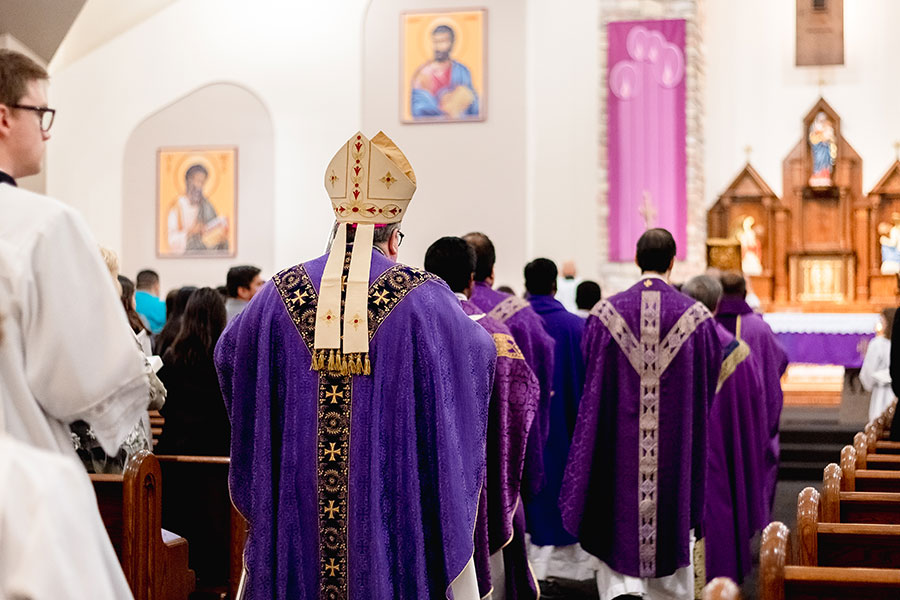Look to future with hope

Bishop Michael Olson processes into Mass at Our Lady Queen of peace on December 8,2019 ( NTC/ Kenneth Munyer)
Editor’s note: Bishop Michael Olson was interviewed recently by Fr. Robert McTeigue, SJ, on the radio program “The Catholic Current.” Below, we have excerpted some highlights about the coming year (and beyond) from their wide-ranging conversation.
What’s on your to-do list between now and the next meeting of bishops in June 2020?
Bishop Olson: Prior to the June meeting, we have our ad limina visits to prepare for. Mine is in January along with the other Region X bishops from Texas and Arkansas and Oklahoma. This involves preparation for the audience with the Holy Father as far as what we will discuss and what we need to address. Please pray for us during those meetings.
What do you think are the needs of the Catholic Church in the United States in the coming five years?
Bishop Olson: To discern that, we have to look outside — both to listen to what’s being said in other areas of the Church — but most especially to learn what are the needs we can assist people with — to foster generosity from within us, and to overcome the fear that is currently plaguing us. As the Church, that’s our chief responsibility for the greater aspect of society, which shows the common good of our own society beyond the good of the individual.
We have to confront the reality that there’s very little room anymore to barter, but our institutions have to be evaluated as to how they serve the mission of the Church, and not the other way around.
We’re going to have to get to the point where we call evil, “evil,” and good, “good.” That’s what we’re trying to do all the time, and we’re getting to a point where things are just so formally evil and destructive that it’s very challenging to affirm what is good, in order to bring about more good. We’re coming to that point as a Church in this society.
As far as the interior questions though, so much of our success is going to be contingent upon our responsibilities to take seriously the issues of safe environment, ministerial integrity, and accountability, chiefly on the part of bishops and in the clergy, but also on the part of our lay ministers.
Why would we not be well-served by fear in this time of the Church’s life in the United States?
Bishop Olson: It’s a spiritual truth that discouragement never comes from God. Discouragement is a weapon of the evil one. Fear is a human condition that serves to modify our behavior, to turn to God, and to practice fortitude, all with His grace.
We don’t need foolhardiness any more than we need cowardice, but we have to be vulnerable. There is no courage without vulnerability. In other words, we need the capacity to be wounded for the sake of the truth. That’s something that I’ve seen as a reality in my life and ministry as a bishop during these last six years. That’s been a reality introduced to me again and again.
Without courage, there’s no hope. So, do we believe this or not? Is He the Son of God or not? I say He is because of the blood of the martyrs, and the truth of the Gospel is lifted and passed on and handed down through tradition.
How do you begin to form consciences in a context where every moral issue is opened and decided with the words, “I feel that?”
Bishop Olson: Bishop Robert Barron made a point about the transcendental nature of beauty. That is a starting place because beauty can elicit emotions. Beauty captures the imagination, and it lifts us up. The proportionality of form and the classical understanding of beauty is one of the transcendentals of God.
I find young adults and millennials have a sense of what’s beautiful. There’s something that captivates the millennials about the liturgy or Catholic art. They may be at a loss as to why that is beautiful, but then we can take that to the deeper realities manifested by beauty.
